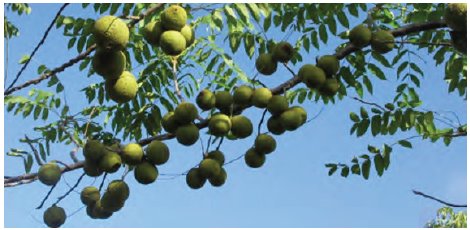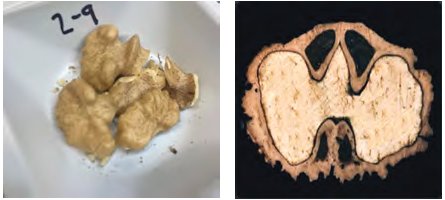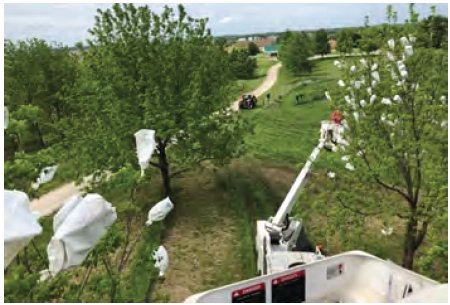AgEBB-MU CAFNR Extension
Green Horizons
Volume 25, Number 3
Fall 2021
 |
| UMCA black walnut selection 'C7' showing the ideal spur-bearing branch habit loaded with nuts. |
Black walnuts produce a highly sought-after nut with a robust flavor. Markets are well- established for their kernels and nutshells throughout the State of Missouri. However, nearly all black walnut nut production comes from foraging wild trees - improved cultivars are not yet widely in production. Annual nut harvests from wild trees are highly variable in both yield and quality. Missouri's crop ranges from 12 to 16 million pounds (about 65% of the total supply in the U.S.) and brings about $2.6 to $3.5 million to harvesters annually, although biennial bearing can cause steep declines in production. Wild trees also garner a low price of $0.16/lb hulled due to consistently low kernel percentages (6-14%) and mixed quality, with many nuts possessing a dark kernel color and an acrid floral or fermented aroma and flavor. Improved cultivars with a consistent kernel percent (>30%) and other preferred attributes, are currently purchased at prices that are 5-6x higher by Hammons Products Company (Stockton, MO). Two-thousand acres of cultivar orchards are estimated to produce an equivalent volume of nuts currently harvested from wild trees. These improved orchards are needed to stabilize nut supply and quality, both of which would then give the industry opportunity for growth. The current scarcity of cultivated black walnut orchards results from a limited availability of improved selections and cultivars, not from a lack of grower interest.
The University of Missouri Center for Agroforestry (UMCA) established a black walnut improvement program in 2000. The goal was to use its germplasm repository, representing 66 cultivars, to develop improved nut cultivars for use in agroforestry-based planting systems. Components of the program focused on 1) cultivar and germplasm acquisition and evaluation, 2) development and evaluation of seedling breeding populations produced through controlled pollinations, and 3) establishing field trials across multiple sites in Missouri that focus on the performance of the collection for key traits. High priority traits and selection criteria include high kernel percentage, high kernel mass, spur bearing habit, and yield efficiency.
 |
| UMCA black walnut selection 'A3' with large, light-colored kernels and a nut cross section with high kernel percentage. |
 |
| Black walnut controlled crosses require elevation high into the canopy using boom lifts where abundant flowers can be reached and pollinated. Once pollination is complete the flowers are covered with specialized pollen exclusion bags to protect the flowers from unwanted crosspollination. |
The time required to select improved offspring (and cull undesirable seedlings) of most tree fruit and nut crops is long, up to 8-12 years. However, the UMCA has made significant gains in breeding high-quality, high-yielding black walnut cultivars within the first generation of the breeding program. In 2010, nine black walnut selections were transitioned to replicated performance trials, where they are under ongoing evaluation as candidate new cultivar releases. As a transition to full release, our program expects to make a preliminary release of these materials starting in 2023. This limited release is intended to position us for an eventual full release, while we finalize our complete cultivar characterization, build up scion supplies for nursery propagation, establish on-farm trials for testing across environments, and educate growers on performance benefits and cultural practices for black walnut in an orchard setting. The Missouri black walnut industry has long awaited the opportunity to cultivate elite UMCA cultivar releases in new orchards, and we are excited to begin rolling out these materials.
If you are interested in cultivating UMCA's preliminary black walnut cultivar releases, please contact the Revord lab for more details:
Dr. Ron Revord (r.revord@missouri.edu) and/or J. Bryan Webber (jbwebber@missouri.edu).
